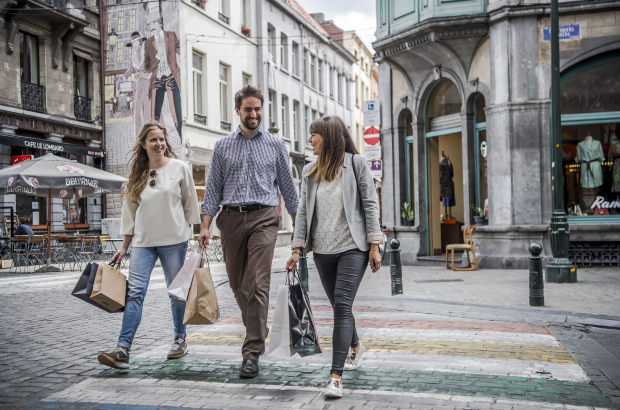- Daily & Weekly newsletters
- Buy & download The Bulletin
- Comment on our articles
Despite rise of shopping centres, Brussels residents loyal to downtown
Location, location, location. That’s what a new study on shopping habits among Brussels residents amounts to.
A large majority – 87% – of purchases, from groceries to shoes to sofas, are carried out in the region itself. Most of the rest happen just over the border, in towns like Zaventem and Drogenbos.
While 95% of residents do the big weekly grocery shopping trip at a supermarket – Delhaize is the most popular – daily purchases of fresh foods like meat and bread are done in the smaller shops close to home or work. Residents travel an average 2.2 kilometres to get to their desired supermarket, but they’re not interested in going out of their way for a quick after-work purchase.
They’re willing to go further, though, for what the study refers to as “light semi-daily” purchases like clothes, books and other non-food items, with an average 3.6 kilometres travelled for those purchases. And “heavy semi-daily” needs, like furniture and large appliances, gets them even further from home at 3.8 kilometres travelled on average.
Ikea is, not surprisingly, the most popular place to buy furniture, which accounts for quite a lot of the shopping done over the border.
So go downtown
Interestingly, however, the centre of Brussels is the most popular area by far to buy the light semi-dailies, with one-quarter of all purchases in that category made there. The centre is followed in popularity by Woluwe Shopping centre, which trails at 10.6%, and Avenue Louise (8.7%).
The study was commissioned by Brussels economy minister Didier Gosuin (Défi) and carried out by ULB in co-operation with research firms. The results, says Gosuin, are proof of the government’s need to support urban businesses rather than larger shopping complexes on the edges of town.
“To stimulate trade, we need to concentrate our resources there rather than on shopping centres like Docks and Neo,” he told Bruzz, “which target shoppers from outside the region and weakens the economic power of existing trading centres.”
More notable findings: Contrary to popular belief, online shopping is not taking over, with just 6% of purchases of light semi-daily items ordered on the internet. And, even if they don’t travel that far, Brussel residents by-and-large still use their cars. Taking the three categories together, 57% take the car to go shopping.
Photo: Eric Danhier/Visit Brussels




















Comments
Neo?
Neo is the shopping and leisure complex planned for Heysel
https://www.thebulletin.be/green-space-replace-demolished-bruparck-build...